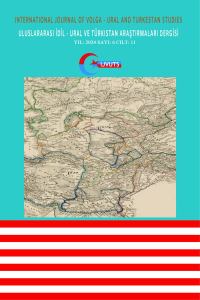Öz
The emergence of modern Uzbek language is closely related to the migration movements of Turk communities towards today's Uzbekistan geography. Turks who reached this geography encountered settled city people of the Transoxiana cultural axis with a relatively high intellectual level. This situation resulted in the Turks, who have a nomadic tradition, being greatly influenced by the culture and language of the settled people. However, the political and social power of the Turks prevented this influence from reaching the level of assimilation. Especially after the Timurid Era, the influence of the Turks on the local folk culture gradually increased. In this article, the interaction between Turks and Indo-European settlers, it was interpreted with the hermenetic technique, taking into account historical, sociological, ethnographic and folklore data. In order to confirm the information interpreted with this technique, phylogenetic studies, which provide more objective data than other methods, were used, and the reasons for the common phonemicization and grammatical unification between Uzbek and Tajik were emphasized. In addition, as a result of these grammatical events, the distinguishing features of Uzbek from other Turk languages are discussed together with their historical reasons. Thus, it is aimed to determine in general terms the effects of the linguistic composition of today's Uzbekistan geography on Uzbek language.
Anahtar Kelimeler
Historical development of Uzbek language Relationships between Uzbek language and Iranian languages Distinguishing features of Uzbek language from other Turk languages Multilingualism in Uzbekistan.
Kaynakça
- Akbıyık, H. A. (2003). Timur’un Toktamış üzerine seferleri ve Altın Orda’nın yıkılması meselesi. Bilig, 27, 117-156.
- Alyılmaz, C. (2002). Eski Türk şehirleri ve Semerkant. Atatürk Üniversitesi Türkiyat Araştırmaları Enstitüsü Dergisi, 9 (20), 303-311.
- Avcı, N. (2017). Schuyler’in Seyahatnamesi’ne göre Rusların Taşkent’i ele geçirişleri ve Çar II. Aleksandır’ın beyannamesi. Kırıkkale İslami İlimler Fakültesi Dergisi, 2(3), 9-18.
- Azimov, I. M. (2023). The problem of vowels in the Uzbek language. The American Journal of Social Science and Education Innovations, 5(04), 73-81.
Öz
Çağdaş Özbekçenin ortaya çıkışı, Türk topluluklarının bugünkü Özbekistan coğrafyasına yönelen göç hareketleriyle yakından ilişkilidir. Bu coğrafyaya ulaşan Türkler, burada Maveraünnehir kültür aksının entelektüel seviyesi yüksek yerleşik şehir halklarıyla karşılaşmıştır. Bu durum göçebe bir geleneğe sahip Türklerin, yerleşik halkın kültür ve dilinden büyük oranda etkilenmesiyle sonuçlanmıştır. Fakat Türklerin siyasi ve toplumsal gücü, bu etkilenmenin asimilasyon boyutuna erişmesini önlemiştir. Özellikle Timur Devri’nden sonra Türklerin de yerel halk kültürü üzerindeki etkisi gittikçe artmıştır. İşte bu makalede, Türkler ve yerleşik halk arasındaki etkileşim; tarihî, sosyolojik, etnografik ve halk bilimine dair veriler dikkate alınarak hermönetik teknikle yorumlanmıştır. Bu teknikle yorumlanan bilgilerin teyit edilmesi için ise diğer yöntemlere göre daha nesnel veriler sunan filogenetik araştırmalardan yararlanılmış, Özbekçe ve Tacikçe arasındaki ortak fonemleşme ve gramatik birleşme hadiselerinin sebepleri üzerinde durulmuştur. Ayrıca bu hadiseler sonucunda Özbekçenin diğer Türk lehçelerinden ayrışan özellikleri, tarihsel sebepleriyle birlikte tartışılmıştır. Böylelikle bugünkü Özbekistan coğrafyasının dilsel kompozisyonunun Özbekçeye olan etkilerinin genel hatlarıyla saptanması amaçlanmıştır.
Anahtar Kelimeler
Özbekçenin tarihî gelişimi Özbekçenin İrani dillerle ilişkisi Özbekçenin diğer Türk dillerinden ayrışan özellikleri Özbekistan’da çok dillilik
Kaynakça
- Akbıyık, H. A. (2003). Timur’un Toktamış üzerine seferleri ve Altın Orda’nın yıkılması meselesi. Bilig, 27, 117-156.
- Alyılmaz, C. (2002). Eski Türk şehirleri ve Semerkant. Atatürk Üniversitesi Türkiyat Araştırmaları Enstitüsü Dergisi, 9 (20), 303-311.
- Avcı, N. (2017). Schuyler’in Seyahatnamesi’ne göre Rusların Taşkent’i ele geçirişleri ve Çar II. Aleksandır’ın beyannamesi. Kırıkkale İslami İlimler Fakültesi Dergisi, 2(3), 9-18.
- Azimov, I. M. (2023). The problem of vowels in the Uzbek language. The American Journal of Social Science and Education Innovations, 5(04), 73-81.
Ayrıntılar
| Birincil Dil | İngilizce |
|---|---|
| Konular | Güney-Doğu (Yeni Uygur/Özbek) Türk Lehçeleri ve Edebiyatları, Orta Asya Tarihi |
| Bölüm | Makaleler |
| Yazarlar | |
| Yayımlanma Tarihi | 29 Şubat 2024 |
| Gönderilme Tarihi | 11 Şubat 2024 |
| Kabul Tarihi | 27 Şubat 2024 |
| Yayımlandığı Sayı | Yıl 2024 Cilt: 6 Sayı: 11 |


